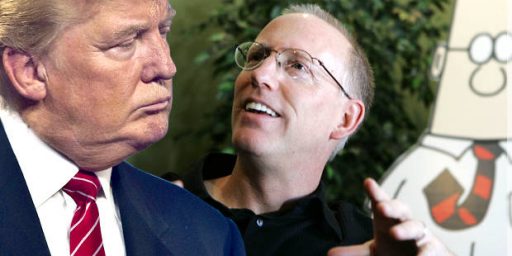Donald Trump, Human Bias, and the Art of the Deal
Tomorrow morning, I teach a seminar on “Perception, Cognition, and Biases” as part of our introductory Think, Decide, and Communicate course. Just in time, Scott Adams, creator of Dilbert and author of several related books, has written two interesting blog posts on how the Donald Trump campaign is brilliantly manipulating bias and other weaknesses in how humans evaluate information.
In “Clown Genius,” he illustrates the power of anchoring bias:
As I said in my How to Fail book, if you are not familiar with the dozens of methods of persuasion that are science-tested, there’s a good chance someone is using those techniques against you.
For example, when Trump says he is worth $10 billion, which causes his critics to say he is worth far less (but still billions) he is making all of us “think past the sale.” The sale he wants to make is “Remember that Donald Trump is a successful business person managing a vast empire mostly of his own making.” The exact amount of his wealth is irrelevant.
When a car salesperson trained in persuasion asks if you prefer the red Honda Civic or the Blue one, that is a trick called making you “think past the sale” and the idea is to make you engage on the question of color as if you have already decided to buy the car. That is Persuasion 101 and I have seen no one in the media point it out when Trump does it.
The $10 billion estimate Trump uses for his own net worth is also an “anchor” in your mind. That’s another classic negotiation/persuasion method. I remember the $10 billion estimate because it is big and round and a bit outrageous. And he keeps repeating it because repetition is persuasion too.
I don’t remember the smaller estimates of Trump’s wealth that critics provided. But I certainly remember the $10 billion estimate from Trump himself. Thanks to this disparity in my memory, my mind automatically floats toward Trump’s anchor of $10 billion being my reality. That is classic persuasion. And I would be amazed if any of this is an accident. Remember, Trump literally wrote the book on this stuff.
You might be concerned that exaggerating ones net worth is like lying, and the public will not like a liar. But keep in mind that Trump’s value proposition is that he will “Make America Great.” In other words, he wants to bring the same sort of persuasion to the question of America’s reputation in the world. That concept sounds appealing to me. The nation needs good brand management, whether you think Trump is the right person or not. (Obviously we need good execution as well, not just brand illusion. But a strong brand gives you better leverage for getting what you want. It is all connected.)
And what did you think of Trump’s famous “Rosie O’Donnell” quip at the first debate when asked about his comments on women? The interviewer’s questions were intended to paint Trump forever as a sexist pig. But Trump quickly and cleverly set the “anchor” as Rosie O’Donnell, a name he could be sure was not popular with his core Republican crowd. And then he casually admitted, without hesitation, that he was sure he had said other bad things about other people as well.
Now do you see how the anchor works? If the idea of “Trump insults women” had been allowed to pair in your mind with the nice women you know and love, you would hate Trump. That jerk is insulting my sister, my mother, and my wife! But Trump never let that happen. At the first moment (and you have to admit he thinks fast) he inserted the Rosie O’Donnell anchor and owned the conversation from that point on. Now he’s not the sexist who sometimes insults women; he’s the straight-talker who won’t hesitate to insult someone who has it coming (in his view).
In a follow-up, “Can We Call a Trump Puppet a Trumpet?” he observes,
Trump wants to “Make America Great.” All three of those words are winning words. That choice of words is no clown accident. Trump is making people associate his brand with America, greatness, and even “making” stuff, which is generally good. Every time you hear his slogan, or read it, the association is strengthened.
Compare Trump’s slogan to some dumb-ass intellectual slogan such as “I will make government smaller!” The words government and smaller are total loser words. The quality of that person’s argument will be lost on most voters. All they will know is that Trump wants to make them great while the other candidate wants to make something smaller.
My main point is that intellectual arguments lose to visual arguments and to powerful associations such as “America” and “great.” You think Trump is spouting calorie-free non-policies because he’s an idiot who hasn’t done his homework. The reality (as far as I can tell) is that he’s playing three-dimensional chess with two-dimensional opponents.
Here I’ll remind you that I don’t support any of the candidates at this point. My main interest in Trump is his persuasion skills.
The full posts are worth your attention but the excerpts above give you the general idea. The point here isn’t a commentary on the Trump candidacy so much as the weaknesses of the Rational Actor Model (Allison’s Model I), which is the central simplifying assumption of most social science. It makes the world much easier to understand if we pretend that human beings are fundamentally rational creatures, weighing costs and benefits with no emotions or psychological barriers (what economists refer to as “homo economicus”). We’ll take this shortcut repeatedly over the course of the Command and Staff College curriculum to help constrain the discussion of complex topics into something understandable (and frequently point out that we’re doing so). But that’s not who we are.







Didn’t need Trump to learn about making America great again. Already knew we could do it for it for “Yes we can.” Obama is a simpler soul.
What worked for Obama will not work for Trump…well, if getting all the way to the White House is the objective, that is…
Branding, marketing, and a banner ad that has a positive message will carry you far; particularly if you have a successful history backing you up. Go Trump!
@Thomas Weaver:
Trump’s record of being born the son of a very successful father is indeed a solid one…
@anjin-san: And declaring bankruptcy 4 times. Seems to me the only thing he is good at is taking other people’s money. Kinda like Dillinger.
When a door-to-door sales person comes to my house and asks a ‘sales’ question, i respond “What do you want?” and continue along that vein until they tell me what they are after, without asking me questions.
I feel the Vox post on Trump’s mastery of reality television put it better than Scott Adams. Still not sure I believe them. Author writes as if reality TV inculcates a new skill set in manipulation of crowds, but it’s a basic thing going back before Protagoras.
There are written and unwritten rules about what one can do when one is running for the nomination of a major party for president. Trump is disposing of the invisible rules and leaving the other candidates in his crazy wake, but the problem is they’re not clever enough to do anything but lackluster mimicry of his style. Take Huckabee who seems to have gone mad lately. It’s possible he would’ve said this crap anyway, but Trump’s forays into bravado politics have given Huckabee the cojones to speak madness. However, he still frames his insanity around relevant issues in specific so he comes off crasser than vacuous Trumpsprechen.
“[The people Mexico is sending over] are rapists” is a kind of clueless, grand prejudice that it’s hard to shake anything at because it presumes so much as to choke debate. You can reckon with it seriously, but you’re left overthinking things while Trump says something else.* “That ten year old can’t have an abortion just because she was raped by her stepfather,” in contrast, is a policy prescription with ready-made blocs willing to slug it out. Trump communicates to an area of the brain unused to thinking politically (it’s mostly used to decipher the comedy of Seth MacFarlane) while Huckabee is communicating to the overstimulated and weary area Democrats and Republicans have been hitting for years.
* Shades of Rovian solipsism at play, though I doubt Rove ever considered applying it to individuals instead of institutions. More importantly, the things Trump says are considered “out of bounds,” which means no one in debate prep plans to respond adequately. This’ll probably change before the CNN debate.
@Thomas Weaver:
Which one of his 4 filings for bankruptcy do you consider to be his greatest success?
@Tillman:
In reference to the debate point,
These shows aren’t really debates and The Donald’s act trumps (ahem) that game to a degree. Gingrich’s Observation: “You can’t debate with someone who lies all the time.” is essentially correct..
He was speaking in regards to Mitt and Ryan’s Gish Gallop but what Trump does shares many of the essential traits. However it also shares the risks inherent of high-wire acts. Biden’s debate with Ryan showed how to bust up a Gish Gallop. “No rules? Well, I’ll just interrupt whenever I feel the need and you go right ahead and cry about it…if you want to…but you’re gonna be spending a lot of time whining and that’s what people are going to remember.”
Busting up a Big Lie guy isn’t rocket surgery, you just have to keep him from filibustering and his lying grants a considerable amount of leeway.
@OzarkHillbilly: @al-Ameda:
Adam’s deals with the bankruptcies in his latest post pointing out the political reporters (used to goal oriented thinkers) are covering a business candidate (who thinks in a system oriented way).
@JKB: Yes, the question is whether you want someone who thinks like that for POTUS. Reminds me of the line out of Dr. Strangelove: “I’m not saying we wouldn’t get our hair mussed, but I estimate 40, 50 million casualties, tops.”
I don’t want a President who would think it’s perfectly fine to lose a chunk of the US in exchange for taking out ISIS.